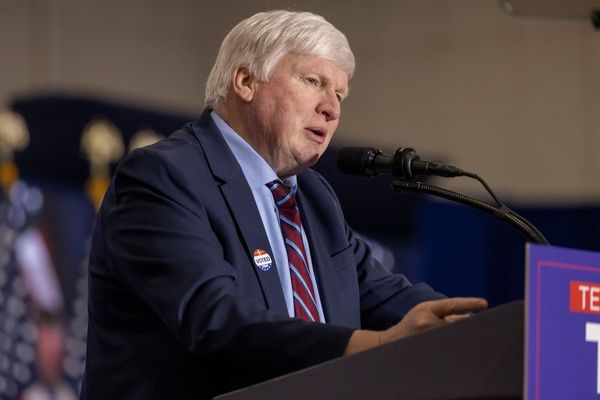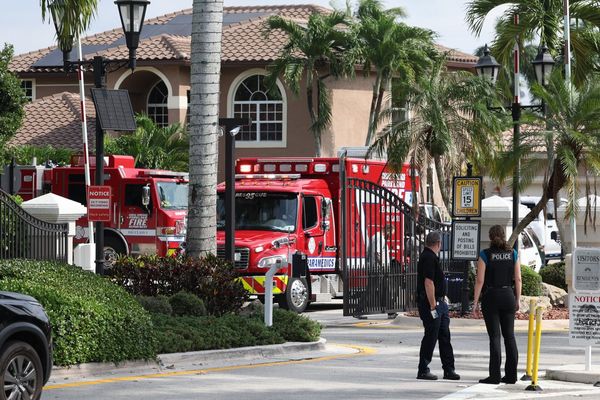
There is something wonderful about election days in Australia. Compulsory voting drags us all in to civic participation. This morning, families walked together through my neighbourhood to cast their ballots in the voice referendum, and loitered, chewing the fat around the sausage sizzles and the cake stalls.
But there was also a sense of dread as we crept closer to the close of the polls. Voters understood the stakes. Australia would either write another chapter in the history of reconciliation in this country, or fail a significant empathy test.
Tonight, we’ve failed the empathy test.
Indigenous people had asked to be seen and heard in their own continent. That request has a context. British colonists occupied a country. There was a fiction the land mass was unoccupied. Waves of arrivals then settled Australia by force. Country was seized. Resistance was crushed, frontier battle by frontier battle. That silencing of First Nations has never been fully unwound. The voice to parliament was supposed to be an institutional gesture ending two centuries of silence. But a majority of us said no.
A lot will be written over the coming days and weeks about the impact of misinformation, the role of social media, the weight of issues diverting the voting public from focusing on the simple proposition in question at this referendum. There will be verdicts delivered on whether or not the “yes” campaign’s strategy and execution were sufficient to withstand the predictable onslaught of negativity.
This analysis is important. It will form the first draft of history about this campaign.
But the political analyst Peter Brent made a cut through point in a piece about the referendum he wrote for Inside Story this week. History tells us “midterm Labor government referendums get slaughtered”, Brent said, “partly because Liberal opposition is all but inevitable.”
People voted no in large numbers for a bunch of reasons. They didn’t vote no because Peter Dutton told them to. Progressive people voted no. Some rusted-on Liberals voted yes. But Dutton’s decision to say no, and help flood the zone with shit, was certainly part of the reason public support for the voice tanked.
I want to be very clear about this.
We see you Peter Dutton. We know what you did.
A lot will be written about whether or not it was wise for Anthony Albanese to proceed given Dutton’s opposition made the referendum more likely to fail than pass. Protagonists and commentators will have different views about this. Was this hubris? Arrogance? Did Albanese, insulated in his post-election honeymoon, fatally underestimate his opponent? Worse, did he fail to comprehend the national mood? Did Albanese fail to compromise on the model at a critical moment, thereby pushing Dutton to adopt the hard no stance that he did?
We are going to hear a lot about sliding door moments over the next few days. This narrative started on the referendum night panels on major television networks. Liberals will say Albanese could have got a bunch of us over the line if he’d dumped the constitutional enshrinement of a voice speaking to parliament and the executive.
I think this is true. I think more federal Liberals would have joined Julian Leeser, Bridget Archer and Andrew Bragg if the wording of the constitutional amendment had been different.
But I predict we’ll hear a lot less about the counter-factual – how could Albanese have gone to the people with a proposition that Indigenous leaders hadn’t actually asked for? In the real world I mean. Indigenous leaders wanted a constitutionally enshrined voice to parliament and the executive. That was the ask. Backing off that would have been incredibly fraught.
Having five or six more Liberals standing alongside the prime minister in a contested referendum campaign is not nothing. It would have helped. But it’s not a magic bullet either. A handful of Liberals saying yes doesn’t feel enough to offset a tsunami of negativity, including from the opposition leader.
The defeat of the voice opens so many questions about how we move forward.
The empathy gap we can measure in tonight’s result points to some stark realities. A lot of Australians have never met an Indigenous person. Generations of Australians are unaware at a granular level about the foundational wrong that occurred at the time of settlement, and the litany of policy disasters that followed it, because that history wasn’t taught until relatively recently. Some Australians who live alongside Indigenous communities don’t make the connection between the studied phenomenon of intergenerational trauma and the problems they see.

Moving forward will require a return to first principles. Education. Listening. A serious and truthful reckoning with the past.
It will require a new generation of Indigenous leadership to pick up the pieces of this failure – which is one of the more heartbreaking realities about this result. Once again, the burden of trying to atone for the wrongs, the obligation of building allies and creating the structures to move forward, will fall on the people who have been marginalised in their own land.
The rest of us should have led this healing. We should have stepped up. The majority should have had the grace to deliver for the minority. But we failed the grace test.
There are also questions about what Albanese takes from this result.
The kid from public housing in Camperdown is an optimism player. He’s prospered in life because of his own resilience and because people were good to him when it mattered. He believes in progress because progress aligns with his life story. This result will surely dent his default optimism.
People from the Labor left in New South Wales are used to losing. Albanese has suffered many defeats and reversals on the way to taking the most powerful office in the land. But this one clearly hurts. The prime minister has enough emotional intelligence to realise a no vote delivers pain to Indigenous people and their allies and friends. On Saturday night it was very clear he felt the weight of that disappointment, that deep pain.
Albanese had backed himself to get this done. He thought he could bend a country in the direction of progress without breaking it. That was the wrong judgment. The timing for the conversation was wrong, and there were too many obstacles. After it was clear the voice had been defeated, the prime minister took responsibility for the decision to proceed with the referendum. That call was his, and he wanted people to know he would continue to be “ambitious for our country, ambitious for us to be the very best version of ourselves.”
Months ago, Albanese thought a victory tonight, a new chapter in the reconciliation story, would define his prime ministership. Instead, how Albanese emerges from this defeat, how he recalibrates, the lessons the prime minister learns, will actually be the defining moment. Albanese leant on Winston Churchill to visualise the path ahead, for the country and for his own prime ministership. “Success is not final, failure is not fatal - it is the courage to continue that counts.”







